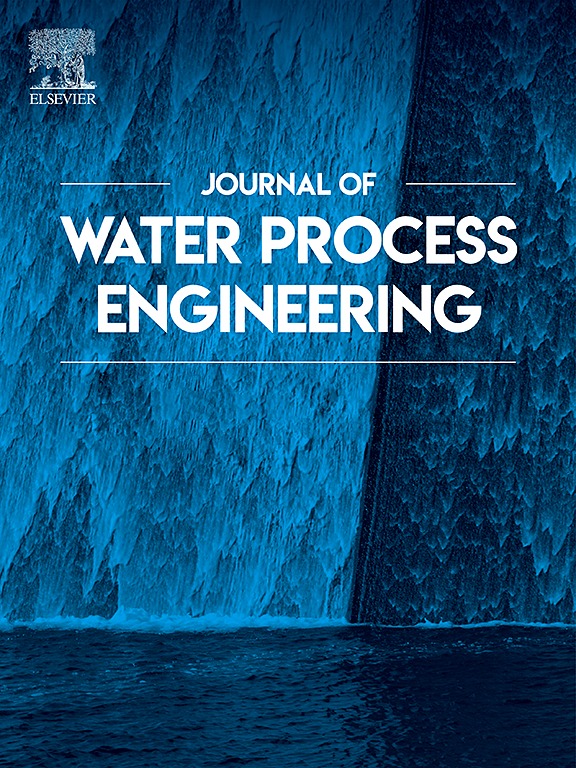Investigation of nitrogen conversion efficiency in hydrogen-based autotrophic nitrate reduction reactor
IF 6.3
2区 工程技术
Q1 ENGINEERING, CHEMICAL
引用次数: 0
Abstract
This study investigates the performance of a hydrogen-based membrane biofilm reactor (MBfR) for nitrogen transformation over an extended operational period exceeding 200 days. During operational monitoring, the reactor sustained highly alkaline conditions with pH consistently exceeding 11.20, while achieving an ammonia conversion efficiency above 60 % and maintaining a nitrite accumulation rate below 1 %. Integrated mass balance calculations and microbial community profiling revealed the coexistence of denitrification and dissimilatory nitrate reduction to ammonium (DNRA) pathways within the nitrogen transformation network. A factorial experimental design was implemented with hydraulic retention time (HRT) and influent nitrate concentration as independent variables, generating nine distinct operational regimes through cross-variable permutations. Subsequent analysis of extensive experimental datasets enabled the development of a Response Surface Methodology (RSM) model to simulate nitrogen conversion dynamics. Model validation confirmed the statistical reliability and predictive accuracy of the RSM framework. Critical analysis demonstrated that ammonia conversion efficiency in the hydrogen autotrophic nitrate reduction system exhibited significant correlation with individual variables themselves but showed negligible dependence on their interactive effects. These findings provide novel insights into process optimization strategies and theoretical understanding of nitrogen convention.

求助全文
约1分钟内获得全文
求助全文
来源期刊

Journal of water process engineering
Biochemistry, Genetics and Molecular Biology-Biotechnology
CiteScore
10.70
自引率
8.60%
发文量
846
审稿时长
24 days
期刊介绍:
The Journal of Water Process Engineering aims to publish refereed, high-quality research papers with significant novelty and impact in all areas of the engineering of water and wastewater processing . Papers on advanced and novel treatment processes and technologies are particularly welcome. The Journal considers papers in areas such as nanotechnology and biotechnology applications in water, novel oxidation and separation processes, membrane processes (except those for desalination) , catalytic processes for the removal of water contaminants, sustainable processes, water reuse and recycling, water use and wastewater minimization, integrated/hybrid technology, process modeling of water treatment and novel treatment processes. Submissions on the subject of adsorbents, including standard measurements of adsorption kinetics and equilibrium will only be considered if there is a genuine case for novelty and contribution, for example highly novel, sustainable adsorbents and their use: papers on activated carbon-type materials derived from natural matter, or surfactant-modified clays and related minerals, would not fulfil this criterion. The Journal particularly welcomes contributions involving environmentally, economically and socially sustainable technology for water treatment, including those which are energy-efficient, with minimal or no chemical consumption, and capable of water recycling and reuse that minimizes the direct disposal of wastewater to the aquatic environment. Papers that describe novel ideas for solving issues related to water quality and availability are also welcome, as are those that show the transfer of techniques from other disciplines. The Journal will consider papers dealing with processes for various water matrices including drinking water (except desalination), domestic, urban and industrial wastewaters, in addition to their residues. It is expected that the journal will be of particular relevance to chemical and process engineers working in the field. The Journal welcomes Full Text papers, Short Communications, State-of-the-Art Reviews and Letters to Editors and Case Studies
 求助内容:
求助内容: 应助结果提醒方式:
应助结果提醒方式:


